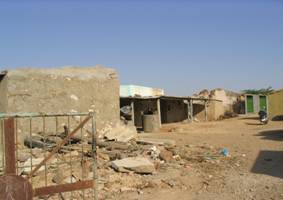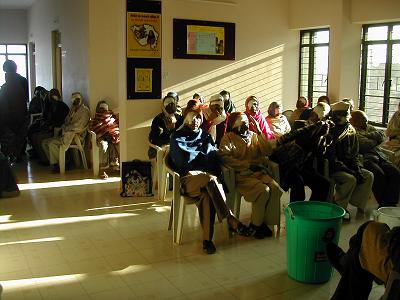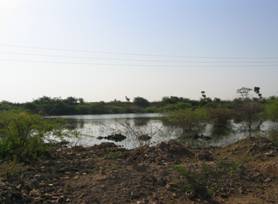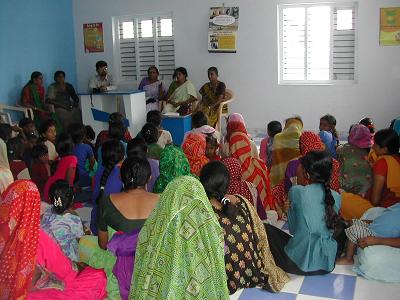|
IHO IN GUJARAT, INDIA… |
|||
|
IHO’s program in Gujarat IHO’s program in Gujarat, India is located in the Kutch district. The villages IHO adopted were among the most severely damaged by a massive earthquake a few years ago. They currently do not have a reliable source of water for drinking and other household purposes. The lack of an adequate supply of water and insufficient or non-existent sanitation have led to a very high incidence of water-borne diseases, often resulting in high infant mortality rates. IHO runs the following four programs in Gujarat to help improve the life of the villagers. 1. Maternal and Child Health Our maternal and child health provide a complete range of preventive health services to improve the health of mothers and children. Among these services are the following:
|
Devastation caused by the earthquake at the future site of The Bhuj Rural Health Center
|
||
|
2. Community-Based Preventive Health Services Included as part of the community-based preventive health service is a blindness prevention program. According to the World Health Organization (WHO), there are nearly 37 million blind people worldwide, 90 percent who live in developing countries. If the screening and treatment that is readily available in the West had also been available to these people 75 percent would not be blind today. The World Bank states that the treatments available for prevention and cure for blindness are amongst the cheapest and most cost effective of all health care interventions, especially when measured against the cost in lost productivity and lifelong sustainabliity that is associated with the loss of sight. Bhuj Rural Health Center provides services for blindness prevention due to such causes as cataracts. In 2005, it provided free treatment and cataract operations. Cataract surgery is a quick, cost-effective operation, which enjoys a high success rate.
|
IHO funds a cataract clinic in Gujarat |
||
|
3. Environmental Health Water-borne diseases are “dirty-water” diseases — those caused by water that has been contaminated by human, animal or chemical wastes. Worldwide, the lack of sanitary waste disposal and of clean water for drinking, cooking, and washing is to blame for over 12 million deaths a year. Water-borne diesases include cholera, typhoid, shigella, polio, meningitis, and hepatitis A and E. Where proper sanitation facilities are lacking, water-borne diseases can spread rapidly. Diarrheal disease, the major water-borne disease, is prevalent in many countries where sewage treatment is inadequate. An estimated 4 billion cases of diarrheal disease occur every year, causing 3-4 million deaths, mostly among children. IHO is providing public sanitation and a clean water supply to prevent most water-borne diseases and deaths in Bhuj. It is important that a clean water supply and the construction of proper sanitary facilities be provided together, because they reinforce each other to limit the spread of infection. Clean water and sanitation facilities have greatly reduced childhood mortality and morbidity. Examples of IHO activities to help prevent illnesses and deaths from water-borne diseased:
|
|||
|
A contaminated pond in IHO’s targeted region is one of the causes of water-borne diseases |
|||
|
4. Health Education and Training As a prevention based health organizatgion, IHO lays great emphasis on educating and training people in different principles and practices of health promotion. These trainings are being provided in ways to maintain and improve health, water sanitation, community leadership, and vocational training of women as a means to empower them. Part of the health education, for example, includes training mothers to prepare and administer Oral Rehydration Therapy (ORT) to their children to prevent and manage dehydration from diarrheal diseases. This simple training may save their children’s lives. The Bhuj Rural Health Center The Bhuj Rural Health Center, located in the village of Kali Talavadi in the Bhuj district, is the main health center in Gujarat. The Rural Preventive Health Center was established in 2002 after a careful review of health indicators and socio-economic indicators for the poorest districts of Gujarat. It was also a result of the devastation caused by the earthquake that hit Bhuj in 2001. The mission of this initiative began with the most common causes of mortality and morbidity in these areas: prevention and control of water borne diseases and providing maternal and child health programs. To date it has served more than ten thousand people directly and has benefited a target population of more than twenty thousand people. Its programs have adapted in accordance with the local health needs and have expanded to include treatment and preventive services. The Bhuj Health Center now has four major components:
|
As part of the Health Education program, mothers are being trained on how to prepare and administer ORS
|
||




